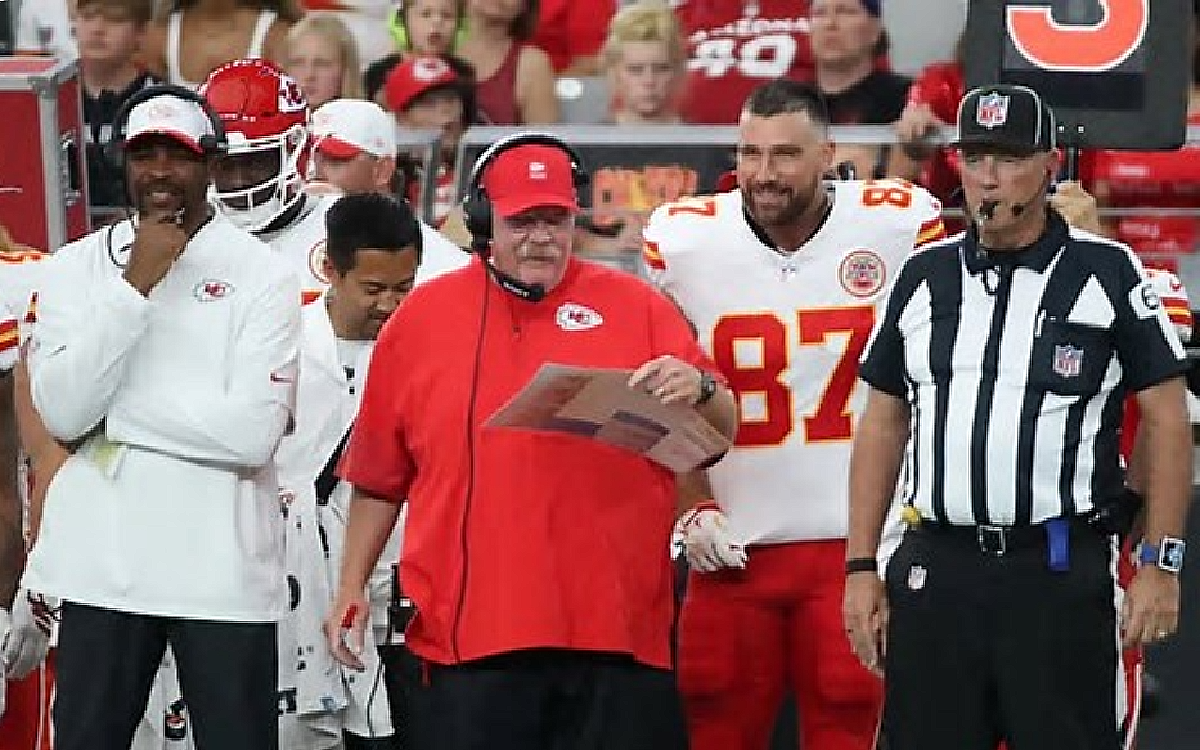Andy Reid wants to know why in-game slap of Travis Kelce didn’t lead to ejection from Chiefs-Chargers

Chargers defensive tackle Teair Tart slapped Chiefs tight end Travis Kelce in the helmet during Los Angeles’ win over Kansas City in Brazil on Friday night.
It wasn’t a light tap. It wasn’t subtle. At the end of a play in which the two were engaged, Tart gave Kelce a full-force smack square in the facemask.
Officials saw the slap and promptly threw a flag for unnecessary roughness. The penalty was enforced half the distance to the goal from the Los Angeles 20-yard line, and the Chiefs scored a touchdown on the next play.
Tart was allowed to continue to play, prompting questions of whether officials should have ejected him from the game. Chiefs head coach Andy Reid was wondering the same thing.
Reid: ‘I don’t understand’
The Chiefs head coach told reporters Monday that he “doesn’t understand” how Tart escaped ejection.
“I don’t understand that rule,” Reid said, per NFL.com. “I guess it’s open-hand, fist, whatever, I don’t know. I don’t know what their decision was on that. But he definitely got hit in the head pretty hard whether it was an open first or a closed fist.”
When asked, Reid said he intends to bring the issue up with the league.
“I’ll work out that with the league,” he continued. “I can’t get into all that.”
What the NFL rulebook states
So why wasn’t Tart ejected? Surely, you can’t just haul off and hit a dude in the head and be allowed to keep playing.
As it turns out, there’s wiggle room in the NFL rulebook. Officials apparently chose to apply it in Friday’s decision to not eject Tart from the game.
Per the rulebook, under the heading of “Automatic Disqualification,” players are actually allowed to throw punches in two different instances in a game before an automatic ejection applies.
From the NFL rulebook:
A player will be automatically disqualified if that player is penalized twice in the same game for committing one of the unsportsmanlike conduct fouls listed below, or a combination of the fouls listed below:
1. Throwing a punch, or a forearm, or kicking at an opponent, even though no contact is made.
The section includes an addendum allowing discretion for officials to eject a player for the first instance of unsportsmanlike conduct if it is deemed “flagrant:”
Nothing in this section supersedes the Game Official’s discretion to judge a foul to be flagrant and disqualify the player based on one occurrence.
Officials apparently did not deem Tart’s slap to be flagrant.
A separate section under the rulebook’s “Player Conduct” heading addresses players “striking an opponent with his fists” and calls for an automatic 15-yard penalty but doesn’t require an ejection. This section also provides officials discretion over whether or not to eject a player depending on if they deem a foul to be “flagrant.”
Penalty: Loss of 15 yards. If any of the fouls is judged by the official(s) to be flagrant, the offender may be disqualified as long as the entire action is observed by the official(s).
NFL fans, of course, have seen plenty of instances in which a player is ejected for the first shot. A full-on hit to head generally warrants such a penalty. Did officials go light on Tart because he used an open hand?
Nowhere in the rulebook does it directly address a “slap,” which is what this was. Maybe the rule-makers didn’t anticipate grown men slapping each other in the face on a field.
But for all intents, this was a forceful hit to the head — closed fist or not — and officials opted to allow Tart to continue to play.